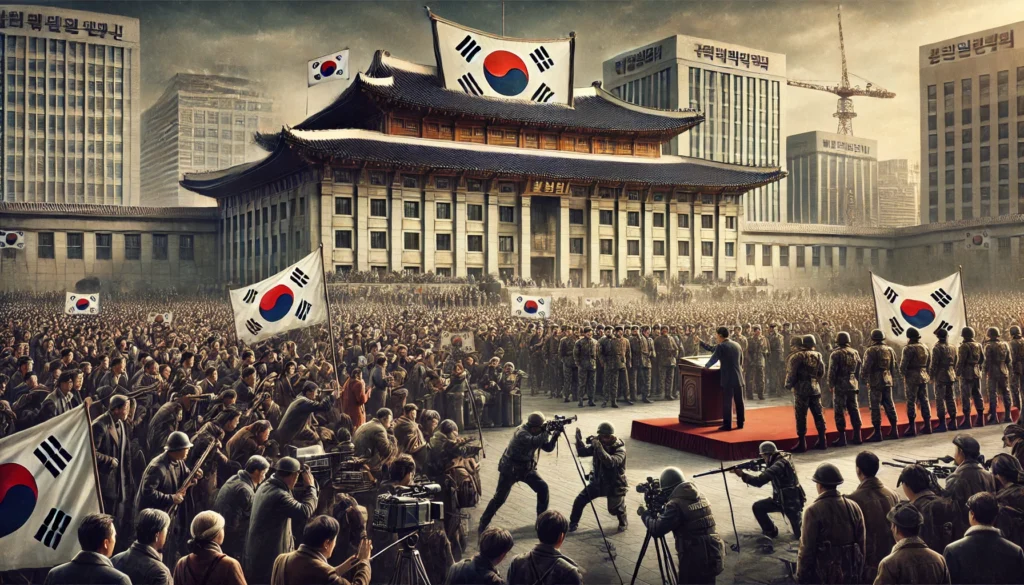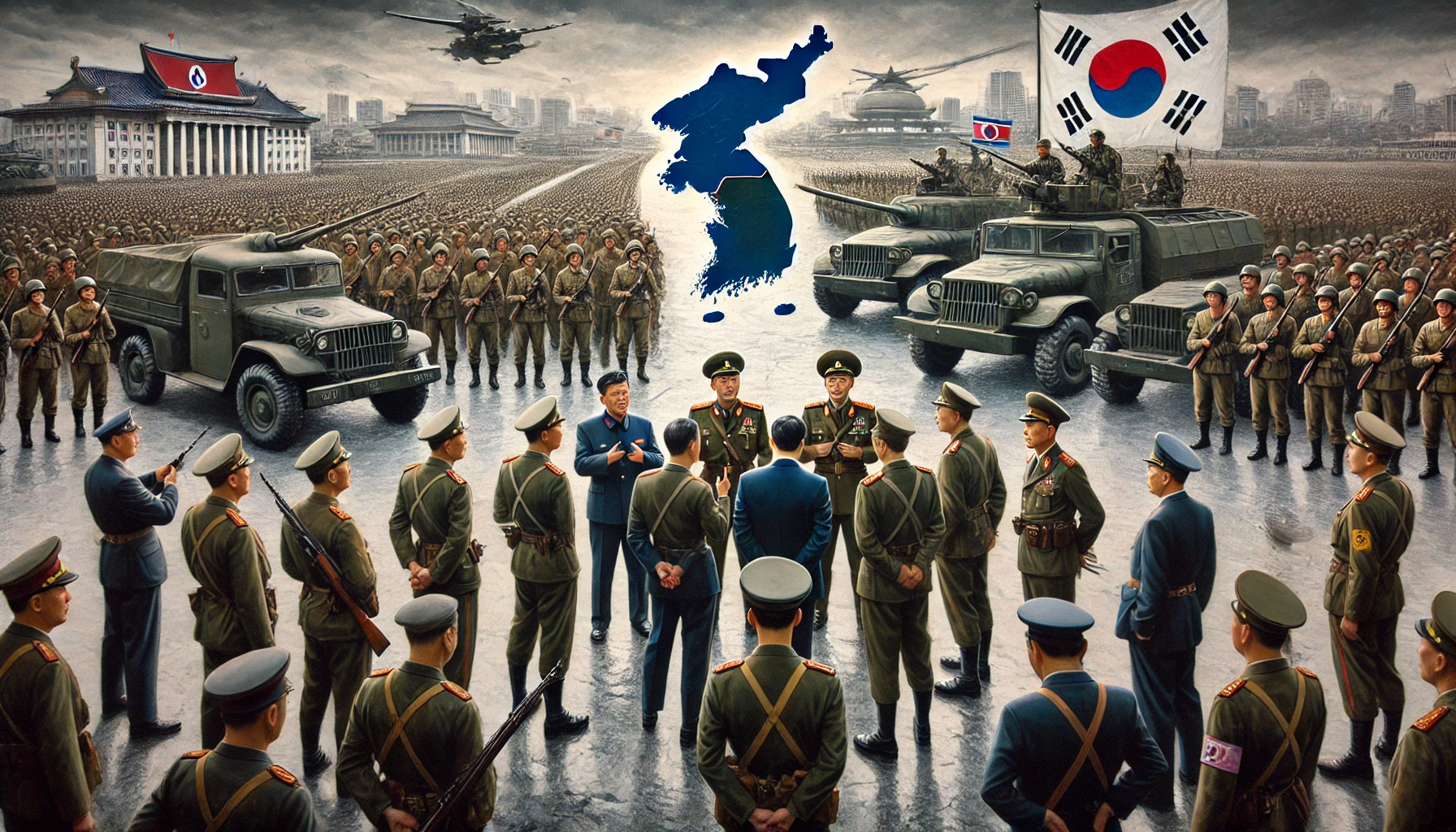The South Korea martial law declaration made by President Yoon Suk Yeol has sent shockwaves through the nation, creating a profound political and social crisis. This unprecedented decision has raised concerns about the future of democracy in South Korea, which has long been a symbol of political stability in Asia. The Korea martial law declaration is not only a historic moment but also one that has deep implications for the country’s governance, freedoms, and international relations.
Table of Contents
The Immediate Impact of the South Korea Martial Law Declaration
The South Korea martial law declaration has immediately altered the country’s political landscape. President Yoon justified the measure by accusing the opposition of destabilizing the country and engaging in actions harmful to national security. The Korea martial law declaration was prompted by the opposition’s motion to impeach top prosecutors and reject a key government proposal. This act of defiance, according to Yoon, posed a direct threat to the state, which he believed required immediate intervention. As a result, the Korea martial law declaration suspended regular political activities, raised the stakes for opposition forces, and led to a dramatic increase in tensions.
Legal and Constitutional Concerns Over the South Korea Martial Law Declaration
The South Korea martial law declaration has sparked intense debate regarding its legality. Many legal experts and political commentators argue that the South Korea martial law declaration is unconstitutional and could set a dangerous precedent for future political actions. The National Assembly’s swift vote to overturn the decree has added to the complexity, leaving the country in a state of legal and political uncertainty. Critics believe that the Korea martial law declaration could undermine the very principles of democracy that South Korea has worked so hard to establish since its transition from military rule in the late 1980s.

Economic Ramifications of the South Korea Martial Law Declaration
The South Korea martial law declaration has far-reaching economic consequences. Strikes, work stoppages, and protests have paralyzed key industries, particularly in the healthcare and transportation sectors. The South Korea martial law declaration has banned these strikes, forcing workers back to their posts under threat of arrest. The measures imposed by the South Korea martial law declaration have disrupted the economic stability of the country, leading to a decline in investor confidence. International markets have reacted cautiously, with the South Korea martial law declaration drawing attention to the political instability that could affect economic relations with South Korea’s trading partners.
Public Reaction to the South Korea Martial Law Declaration
The South Korea martial law declaration has ignited widespread public protests. South Koreans are concerned about the potential loss of civil liberties and the country’s democratic future. The South Korea martial law declaration has sparked mass demonstrations, with citizens marching through the streets of Seoul and other major cities to voice their opposition to the decree. The public backlash is a clear indication of the growing dissatisfaction with President Yoon’s decision. Many fear that the South Korea martial law declaration could lead to authoritarian rule and an erosion of personal freedoms.
Global Response to the Korea Martial Law Declaration
The South Korea martial law declaration has drawn a strong international response. World leaders, particularly from the United States, Japan, and the European Union, have expressed concern over the potential for civil unrest and the erosion of democratic principles in South Korea. The Korea martial law declaration has sparked debates about the role of international actors in influencing domestic political matters. The United Nations has also voiced concerns about human rights violations, urging the South Korean government to ensure that the Korea martial law declaration does not lead to the suppression of fundamental freedoms.
The Future of South Korea Post-Martial Law Declaration
The South Korea martial law declaration represents a critical turning point in the country’s future. The actions taken by President Yoon and the government’s response to opposition challenges will determine whether the Korea martial law declaration is a temporary measure or the beginning of a more authoritarian era. If the Korea martial law declaration stands, it could have long-lasting consequences on South Korea’s political and social structures. Conversely, if the Korea martial law declaration is overturned or modified, it could serve as a reaffirmation of the strength of South Korea’s democratic institutions.
The Role of the Military in Korea Martial Law Declaration
Under the South Korea martial law declaration, the military has been granted extraordinary powers to enforce the decree. The Korea martial law declaration allows the military to arrest individuals without warrants and suppress opposition rallies. The role of the military in enforcing the Korea martial law declaration is particularly controversial, with critics arguing that it represents a step back to the days of military rule in the 1980s. However, supporters of the decree claim that the Korea martial law declaration is necessary to protect national security and prevent the country from descending into chaos.
Opposition to the Korea Martial Law Declaration
The South Korea martial law declaration has faced stiff resistance from various political and civil society groups. The Democratic Party, which holds the majority in South Korea’s National Assembly, has been vocal in its opposition to the Korea martial law declaration. The party has accused President Yoon of attempting to consolidate power and suppress dissent. The Korea martial law declaration has prompted the Democratic Party to call for mass protests and legal action to block the decree. Despite the opposition, President Yoon remains steadfast in his position, claiming that the Korea martial law declaration is necessary for the nation’s stability and future.
The Global Significance of the South Korea Martial Law Declaration
The South Korea martial law declaration has significant global implications. As a key ally of the United States and an economic powerhouse in Asia, South Korea’s political stability is closely watched by the international community. The Korea martial law declaration could potentially affect diplomatic relations and regional security, particularly concerning the ongoing tensions with North Korea. Global actors are closely monitoring the situation to gauge how the Korea martial law declaration might influence the broader geopolitical landscape.
Conclusion: South Korea Martial Law Declaration and Its Long-Term Impact
The South Korea martial law declaration has already made a profound impact on the nation’s political, social, and economic systems. Whether this move will be seen as a necessary measure for national security or a dangerous step towards authoritarianism remains to be seen. The Korea martial law declaration will undoubtedly leave a lasting legacy, shaping South Korea’s future for years to come. How the government and opposition navigate this crisis will determine whether South Korea can maintain its status as a vibrant democracy or whether the Korea martial law declaration marks the beginning of a new era in the nation’s history.



